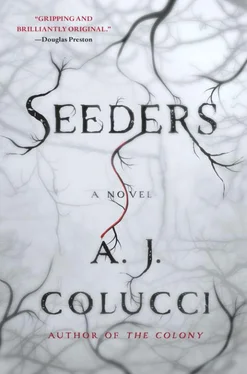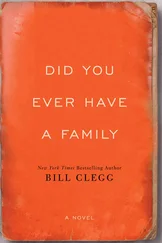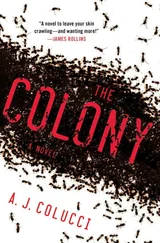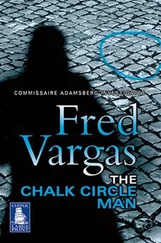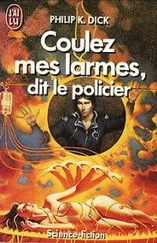“Why are you so anxious to leave?” Jules interrupted. “The boat will be here Wednesday. Surely you can wait until then.”
“Might I remind you there’s a dead man in the woods?”
“Ah, well. He’s waited this long.”
“Luke, go wash up for breakfast.”
“I’m talking to Dr. Beecher.”
“You can do that later. I said wash up.”
“ Wash up . What am I, five years old?”
“How about, go put soap and water on your hands, rinse them off, and eat your oatmeal.”
“Fine.” He shrugged.
Isabelle stepped into the lab as Luke left.
Jules stood, with an awkward bow. “I’m sorry for that scene in the kitchen, Isabelle. Truly I am. Have you thought about what I said—continuing your father’s research?”
She straightened. “Have you thought about what I said? Whatever’s in those biscuits is making you hallucinate.”
He grinned, stepping toward her as he spoke. “I would have expected more from you, Isabelle. Even your son has an open mind about it.”
“I’d rather you not discuss it with him.” Her expression hardened. “The boat won’t be here for eight days,” she said in a clear voice. “That’s a nice campsite in the woods. Maybe you should stay there until it arrives.”
His pupils grew large and dark. “What are you saying?”
“I’m simply looking out for the children.”
“You think I’m dangerous?” He closed in on her space. “You want me out of the house?”
She backed away, but he reached out and grabbed her arms.
“What happened? We started out so well, I could tell you were falling in love with me. Go ahead, say it!”
“Let go of me.” She stared at him, horrified. Across his forehead was a rash of small bumps that followed his hairline down the left side of his temple. Her hand came up and stopped. “What is that—on your face?”
He pushed her away, smoothed down his hair.
She watched him walk to his jacket, slung over a chair.
“Mom?” Luke stood in the doorway. “Could you come with me for a minute?”
Isabelle glanced at Jules, zipping his coat. He was tight-lipped, eyes fixed on the window, and then he started for the back door.
“Yes, I’m coming.”
Isabelle walked with Luke toward the kitchen. “I want you to stop talking to Dr. Beecher.”
“Maybe he’s right, about the plants.”
“Get that idea out of your head. It’s ridiculous.”
They reached the kitchen and Luke stood at the end of the cabinets. “Take a look at this.”
“I don’t see anything.”
“Exactly.”
Then she realized the radio was gone. “Someone took it.”
“No. It’s still here.” He went to the garbage can and pressed the foot pedal.
Isabelle looked inside to see it was smashed to pieces. Her heart was pounding.
“Sean?” he asked.
She shook her head. “My guess is Dr. Beecher.”
“Why would he do that?”
“I don’t know,” she said. “But it looks like we’re stranded for another eight days.”
OVER THE NEXT THREE DAYS, Jules remained at the campsite.
At night when the sun went down, his world was shrouded in darkness. His eyes strained to catch tiny bits of moonlight that fell like brushstrokes on leaves and branches.
Jules lay inside the tent on a pile of scratchy blankets listening to the chatter. Sometimes it was so loud he would move to the beach, sitting with his knees curled up to his chest while his muscles shivered uncontrollably. He’d watch the waves break white, hugging a blanket that was damp from the spray of the sea.
Although the beach was quieter than the woods, he could still hear their cries and he’d plug his ears, pull the blanket over his head. He never bathed, rarely ate, and his appearance became frightening. The rumpled clothes he wore were filthy and his hair a tangled mess. Black rings circled his eyes from sleepless nights, merging with his grizzled beard and dark bumps that speckled his cheeks. If he actually had a mirror, it would show an unrecognizable face.
Jules dreaded going to sleep. Nights were terrifying. As he dozed, they would enter his mind, a physical force connecting to his frontal lobe. He could feel data streaming into his brain, sounds and flashes of colored lights on a ticker tape that twisted through gray matter and gave him chills, as if they were downloading a long, complicated program. At the same time, thoughts and memories were leaving his head. Jules could see the images being emptied out: trees being cut down, logs floating like corpses down a river, forests ablaze, a ground full of stumps, concrete cities being erected, acres of trays filled with mutated seed. It was exhausting to download so much information and in the morning Jules felt physically ill.
Sometimes the messages became too enormous to hear. Their pain and suffering was unbearable and Jules wandered the woods, holding his ears or rolling on the ground, just wanting it to stop. Other times it came as a thwack! that would shake the earth and he would feel a piece of his body slice off, an arm or a leg, and then the warm sting of blood pouring out, his heart beating frantically, life creeping toward its bitter end.
“What do you want!” he screamed one night, but there was no answer. The sun was setting and it was almost dark. Jules knew they wanted him to do something, but what?
He studied the green notebook for a while and decided that he was supposed to spread the plants all over the world. Finish the job George had started and failed. But there was more, and the sounds became unbearable. He fell into a depression and violent images swirled through his mind. Visions of his childhood and vegetal slaughter.
There was finally a moment of silence, and it came with a message that was crystal clear.
Kill them.
At first he didn’t want to believe it. After all, they had never shown any sign of wanting revenge. What if he was misinterpreting their meaning?
You’re a scientist, he told himself. Get ahold of yourself. That’s when he started to doubt everything. How could plants possibly understand a concept like murder, let alone how the human brain works? Even if they had the ability of cognition, it would be nothing like human thought. Why, it was preposterous. Entangling the thought waves of humans and plants would be like entangling the notes of a song with a Swiss cheese sandwich. They were two completely different things.
The campsite was nearly dark and thrown into a chaotic mess, but he searched until he found a pile of handwritten notes, specifically a list of three questions. He read the last two.
How are plants able to understand human thoughts?
What role does the fungus play?
Jules spent the rest of the night perched on a tree stump with a flashlight in his hand, reading the green book and trying to figure out the last two questions. He bit his nails, scratched his beard, and picked at the bumps on his forehead. He studied the drawing of the machine and read the entire book until the sun came up.
On that drizzly morning, the answer came to him.
He was squatting on a damp sleeping bag outside the tent, when the clouds above him cast an eerie shadow over the campsite. He looked at the ground as if he’d never seen it before. The way the fungus was draped over one particular area. The curves and spikes created a collage of shapes that were coming together.
Jules stared at it for several minutes, as light rain fell on his face.
His heart started pounding. He crawled to the spot and began peeling away layers of fungi. His fingernails scraped away the thick pile, exposing pieces of what lay beneath: hard edges, points and grooves, bits of color, until a recognized object was revealed.
Читать дальше
